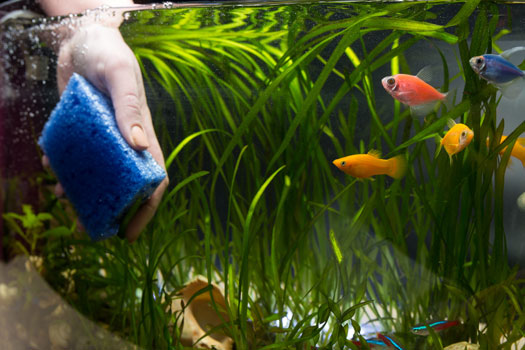Shop At Haya: Your Ultimate Shopping Guide
Discover the best shopping tips, trends, and deals for a smarter buying experience.
Aquarium Care Secrets You Didn't Know You Needed
Unlock aquarium care secrets that will transform your fish tank experience! Discover tips you never knew you needed for thriving aquatic life.
5 Essential Tips for Maintaining a Healthy Aquarium
Maintaining a healthy aquarium is crucial for the well-being of your fish and aquatic plants. Here are 5 essential tips to help you create a thriving underwater environment:
- Regular Water Changes: Frequent water changes are vital to remove toxins and replenish essential minerals. Aim to change about 10-15% of the water weekly to maintain optimal water quality.
- Monitor Water Parameters: Invest in a good water testing kit to regularly check for pH, ammonia, nitrite, and nitrate levels. Keeping these parameters in check will prevent stress and diseases in your aquatic life.
In addition to the basics, consider these further tips to enhance your aquarium's health:
- Proper Filtration: A quality filter is essential to maintain clear and healthy water. Ensure your filter is appropriately sized for your tank and clean it regularly to optimize its performance.
- Feed Wisely: Overfeeding can lead to water quality issues. Always follow the feeding guidelines for your specific fish species, and try to establish a routine to prevent excessive waste.
- Regular Maintenance: Schedule routine tasks such as cleaning decorations, trimming plants, and checking equipment. A little consistent care will go a long way in keeping your aquarium healthy and vibrant.

The Hidden Benefits of Aquarium Plants You Never Knew About
Aquarium plants are often seen as mere decorations, but they offer a plethora of hidden benefits that every aquarist should consider. Firstly, these natural organisms play a vital role in maintaining water quality. Through the process of photosynthesis, aquatic plants absorb carbon dioxide and release oxygen, which is essential for fish and other inhabitants. Additionally, plants help to reduce levels of harmful substances like ammonia and nitrate, acting as a natural filtration system. By providing a balanced ecosystem, aquarium plants reduce the need for chemical treatments and contribute to a healthier habitat for your aquatic life.
Another considerable advantage of incorporating plants into your aquarium is the enhancement of aesthetic appeal and overall experience. An aquarium filled with vibrant greenery creates a dynamic visual display, making it more attractive to viewers. Moreover, plants provide shelter and breeding grounds for fish, fostering a more natural environment. This can lead to improved fish behavior, as they feel secure among the foliage. As a bonus, plants can also help in reducing algae growth by outcompeting them for nutrients, resulting in a cleaner and more beautiful aquarium that requires less maintenance.
What Your Fish are Trying to Tell You: Understanding Aquarium Behavior
Understanding aquarium behavior is crucial for any fish owner looking to create a thriving aquatic environment. Fish communicate through a variety of behaviors that can indicate their mood, health, and needs. For example, when a fish is hiding or staying near the bottom of the tank, it may be feeling stressed or unwell. On the other hand, if your fish are swimming vigorously and exploring their surroundings, it's a sign they are comfortable and happy. Observing these behaviors closely can help you ensure their well-being and address any potential issues.
Another important aspect of aquarium behavior is the social dynamics within your tank. Some species are known to be more territorial than others and may display aggression towards newcomers. Fish that are constantly chasing or nipping at each other may need to have their tank environment adjusted, such as by adding more hiding spots or re-evaluating the fish community you’ve built. Watching these interactions can give you insight into your fish's personalities and help you manage any conflicts in your aquarium.